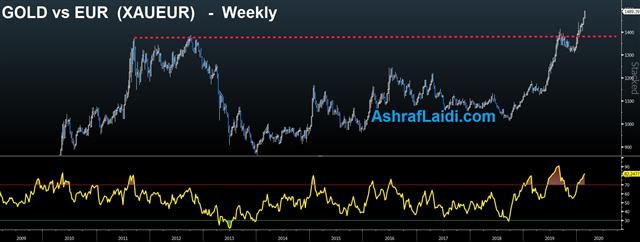Why the Euro Keeps on Falling
Before we cover the euro, we must give mention to the yen's breakdown as USDJPY penetrates the 110.10 resistance to a 9-month high of 111.32. The move emerges alongside a new high in the SP500 and DAX30, while DOW30 attempts to regain 29400. China's annnouncement of further support for affected supply chains has helped sentiment. The USDJPY short was finally stopped out as stops cascaded through 111.30s. CAD and EUR are the only gainers vs the strengthening USD. US building permits were string but housing starts fell. Canada CPI was mixed. All eyes turn to the FOMC minutes and any new insights on the Fed's balance sheet. A new Premium trade has been issued to clients in a non-FX markets, backed by 3 charts and 5 bullet points.

EUR/USD is up today, but has fallen in 3 out of the last 13 sessions.
The euro has fallen virtually every day this month and the number one reason is economic – date is soft and Europe is most-vulnerable to a slowdown in global growth. The 'expectations' component of Tuesday's ZEW sentiment survey fell to +8.7 from +26.7; far short of the +21.5 consensus in the latest example.
Another factor is that the euro has solidified itself as a low-yielder, something we have been highlighting for months. Bloomberg highlighted how single-A rated LVMH was able to launch the largest issue of bonds since 2016 in Europe and sold some of it with a negative yield. Those borrowing conditions are going to entice foreign companies to borrow in euros and that's exactly what Warren Buffett did in the summer.
The third crucial factor is China. Owing to the trade war, China-US trade has been the focus of the past two years but Europe-China trade is arguably more important. Europe is highly-dependent on exports to China and its slate of exports – like autos – are more economically dependent than US sales, which are now buffered by the phase one trade deal. In short, Europe is more vulnerable to coronavirus weakness than some other places (but certainly not all).
Finally and critically, the eurozone has hamstrung its ability to respond to an economic downturn with strict fiscal rules. Markets are increasingly convinced that any economic weakness in the US, China, UK and commodity bloc will be met with fiscal stimulus. That's not the case for the eurozone.
Along the same lines, the FOMC minutes are due at 1900 GMT and could offer clues into how inclined the Fed is toward cutting. The market is now pricing in an 82% chance of a cut in July.
Latest IMTs
-
2x our Gains in 8 Weeks
by Ashraf Laidi | Feb 3, 2026 10:28
-
4500 and 72 Hit, now what?
by Ashraf Laidi | Feb 2, 2026 2:22
-
Warsh Odds Hit Metals
by Ashraf Laidi | Jan 30, 2026 10:56
-
Time Stamp تجزيء زمني للفيديو
by Ashraf Laidi | Jan 29, 2026 9:09
-
Trump Hits Dollar but Wait Bessent & Powell...
by Ashraf Laidi | Jan 28, 2026 11:47








